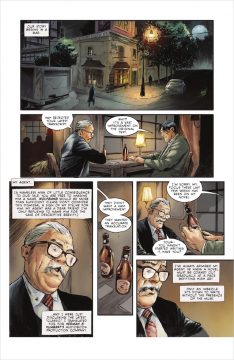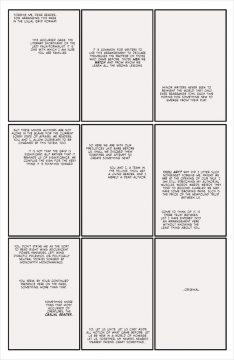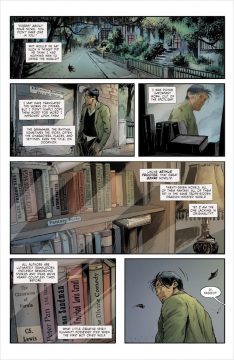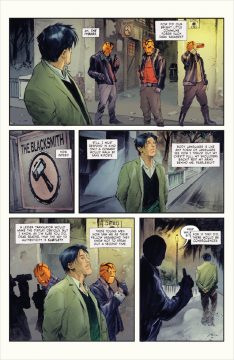“There’s an anti-hero at the core of it, throwing out knight’s moves as the plot tries-and-fails to keep up with him” Ryan O’Sullivan tells about how a plagiarist became the world’s greatest story-teller and potential saviour in Fearscape
 After twisting our brains with psychedelic space adventure Void Trip, writer Ryan O’Sullivan is set to take us to yet another mind expanding world, this time the realm of fears known as the Fearscape. Frustrated writer Henry Henry is given the task of being earth’s saviour after being wrongly identified as our greatest story-teller, and has to enter the Fearscape to take on the world’s biggest fears. Ahead of it’s launch in September we catch up with Ryan to find out more about the terrifying world of the Fearscape and who he would pick as earth’s literary champion!
After twisting our brains with psychedelic space adventure Void Trip, writer Ryan O’Sullivan is set to take us to yet another mind expanding world, this time the realm of fears known as the Fearscape. Frustrated writer Henry Henry is given the task of being earth’s saviour after being wrongly identified as our greatest story-teller, and has to enter the Fearscape to take on the world’s biggest fears. Ahead of it’s launch in September we catch up with Ryan to find out more about the terrifying world of the Fearscape and who he would pick as earth’s literary champion!
 Fearscape sees a writer called upon to be the saviour of mankind and is transposed to an alternate world where fears are a reality – these feel like two very strong concepts which you have combined here, so can you tell us a bit about how the ideas came together and what the inspiration behind Fearscape was?
Fearscape sees a writer called upon to be the saviour of mankind and is transposed to an alternate world where fears are a reality – these feel like two very strong concepts which you have combined here, so can you tell us a bit about how the ideas came together and what the inspiration behind Fearscape was?
Ryan O’Sullivan: “Where do you get your ideas from?” Hello again, old friend. You look different. Have you been working out? A haircut? A new change of clothes? We’ve got to stop meeting like this. People will start talking. They’ll say; “There goes Ryan, who gets his ideas from somewhere we don’t.” Because the truth of it, that my ideas are just as ordinary as everyone else’s, and that all that separates me from others is my stubborn refusal to accept this, is too much to bear. The writer must be a genius, the writer cannot be the same as everyone else. They must light the way.
Fearscape was born from the same creative neurosis as the above non-answer. The mundane truth is that the only way to get rid of certain stories is to write them down.
It has a very interesting use of language, with the narration having a very flowery and verbose tone to it, was this always part of the plan and is it an important part of Henry’s character?
 RO’S: Originally the focus of Fearscape was just a story about mankind’s greatest storyteller battling our greatest fears in a metaphysical fantasy realm. It felt a little dry, so I added Henry Henry, a plagiarist who is mistaken for mankind’s greatest storyteller, and the whole concept seemed to come alive. Suddenly there was this anti-hero at the core of it, throwing out knight’s moves as the plot tries-and-fails to keep up with him. His language is verbose, overpowering, with narration boxes covering word balloons and arguing with the art.
RO’S: Originally the focus of Fearscape was just a story about mankind’s greatest storyteller battling our greatest fears in a metaphysical fantasy realm. It felt a little dry, so I added Henry Henry, a plagiarist who is mistaken for mankind’s greatest storyteller, and the whole concept seemed to come alive. Suddenly there was this anti-hero at the core of it, throwing out knight’s moves as the plot tries-and-fails to keep up with him. His language is verbose, overpowering, with narration boxes covering word balloons and arguing with the art.
One golden rule of writing comics is to never state in the narration what is already shown in the art. I thought I’d play with that – and throw fuel onto the fire that is #artcred – by having the words and art in conflict with one another. Fortunately for me, Andrea, Vlad, and Deron were all on board. The sheer amount of formalist experimentation in Fearscape is indicative of Henry Henry’s character. But I can’t get too much into that without giving away the rest of the story.
The opening page comprises an entirely blank series of panels with exposition over the top. This is a really powerful beginning, was it one of your creation or one of the artist’s ideas? It works really well and it is interesting to see you revisit it later on too?
 RO’S: That was me. Originally, I’d planned to open each issue this way, to anchor the reader into a familiar rhythm after a month away from us. Unfortunately, I discovered that, while interesting in a monthly release format, such a technique would slow down the pace of the story when read in a collected edition and would, as a gimmick, become rather stale by the third or fourth issue.
RO’S: That was me. Originally, I’d planned to open each issue this way, to anchor the reader into a familiar rhythm after a month away from us. Unfortunately, I discovered that, while interesting in a monthly release format, such a technique would slow down the pace of the story when read in a collected edition and would, as a gimmick, become rather stale by the third or fourth issue.
That’s the problem with subversion. You cannot keep doing the same thing; you risk becoming the very thing you criticise. (Assuming, for the sake of argument, that Fearscape is criticising anything. A large number of my pre-release readers have suggested Fearscape is critical of the nine panel grid, or casual readers, or the concept of comic criticism (I’m all for comics criticism – I think it’s a great idea!) I’m not one to argue with readers, but to suggest this is the “great idea” of Fearscape is to assume Henry Henry and I are aligned in our thinking. This is just patently false. Henry Henry is just a character in a story. He doesn’t reflect me anymore than Macbeth reflects Shakespeare. There may be occasions where my own dialogue patter or cognitive idiosyncrasies bleed into the character, but that says more about by limitations as a writer, than my inspirations behind the character. He certainly isn’t my mouthpiece. Not deliberately, at any rate.
 Your artist Andrea Mutti has a really accomplished style and does a brilliant job of making the most of the mundane conversational pages and also the fantastical elements (especially the Muse’s entrance), how did you connect and what does he bring to the project?
Your artist Andrea Mutti has a really accomplished style and does a brilliant job of making the most of the mundane conversational pages and also the fantastical elements (especially the Muse’s entrance), how did you connect and what does he bring to the project?
RO’S: I’m reticent to call any of Andrea’s pages mundane, but he does bring to life the more everyday panels with a certain relaxed extravagance. I think it’s a combination of his ink washes, Vlad’s watercolours, and his uncanny ability to know exactly what elements in each panel to detail, and what to leave to minimalism, that helps make the entire comic maintain its fantastical tone throughout.
Henry asks the Muse this same question, but why did you choose a story-teller to be the hero for this book, rather than someone more aggressive or physical?
RO’S: Write what you know.
 The idea of an imposter taking on the role of a hero feels like a really interesting take on this kind of story, and feels like another great example of you exploring slightly shady characters (as we have seen with your love of villains who are heroes in Turncoat and Void Trip), what is it about this concept which makes for such a compelling story?
The idea of an imposter taking on the role of a hero feels like a really interesting take on this kind of story, and feels like another great example of you exploring slightly shady characters (as we have seen with your love of villains who are heroes in Turncoat and Void Trip), what is it about this concept which makes for such a compelling story?
RO’S: Plain characters that the audience can imprint upon simply feel too rote for my tastes. What first attracted me to comics was the Vertigo imprint at DC Comics in the 80s and 90s. That counter-culture subversion within a fringe medium from writers and artists who took their inspiration from outside of comics. You had characters like Spider Jerusalem, Enigma, and V. Now, some twenty-five years on, you have a readership familiar with obscure ideas, locations, and characters. We can afford to try new things Frodo Baggins no longer needs to carry the torch for us. Let him lest his tiny feet.
And finally, if you had to pick a ‘story teller’ to help fight the good fight in the world of Fearscape, who would you nominate? And how do you think you would manage if you were picked?!
RO’S: I wouldn’t make it past the sirens. As for who I’d pick? James Joyce. He’d talk circles around even the most obfuscationary of fears. And if he ever picked a fight he couldn’t handle, he’d just have Hemingway take care of it for him:
Plus, picking Joseph Campbell would feel like cheating.
Fearscape #1 is available form Vault Comics on September 26th


